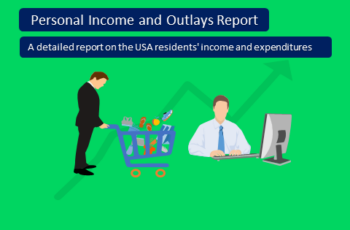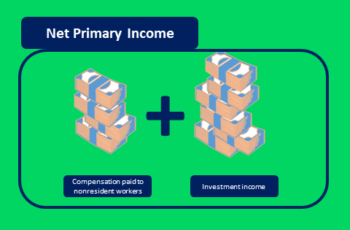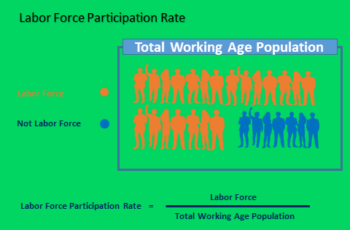A market economy is an economic system where supply and demand guide what to produce how to produce, and for whom to produce goods and services. Moreover, in a true market economy individuals and businesses own all resources.
The market economy is also known as the free market and open market. The point is that the government does not intervene in the economy or supply and demand forces. However, it has some roles. And you will read its roles at the end of this article.
Demand refers to the amount of a good or service that buyers are willing to pay in a given time. Supply refers to the total amount of a product or service available to customers at a specific price in a given time.
The point where the supply and demand are equal is known as the equilibrium point. However, the equilibrium point moves up and down depending on the amount of supply and demand. If the supply decreases or demand increases, the price will go up. On the other hand, if the supply increases or demand decreases, the price will go down. The levels of supply and demand fluctuate until they find another equality.
Market economies are tied to capitalism. Capitalism is an economic and political system in which the private sector owns a country’s trade and production of goods and services for profit. In contrast, in communism, it is the government that owns the means of production.
Characteristics of a Market Economy
Free market characteristics indicate qualities that distinguish it from other systems. The market economy characteristics or features are many. Here are five of them:
1. Limited Government
In a free market economy, the role of the government is limited. In other words, in a market economy, buyers and sellers make most economic decisions, not the government.
In this type of economy, the government takes a “Laissez faire” policy which means “let do” or “let it be.” And the government let the market be naturally competitive.
Due to several limitations and undesirable outcomes of the market system, the government plays limited roles, such as establishing rules and promoting of equity.
2. Private Ownership and Property Rights
In a market economy, the private sector owns or manages a significant portion of resources. It is the opposite of a command economy in that the government owns resources.
Private owners control almost total means of production, allocation, and trade of goods and provision of services. In other words, in an open market, the private sector owns almost all manufacturing and service companies.
The most valuable resource in a modern economy is its human resources. In a free market, the private sector hires most of the labor force, not the public sector.
In a market economy, the government establishes and enforces private property rights. Individuals and businesses have the right to do with their properties as they wish, as long as they do not violate the law.
3. Freedom of Participation and Competition
In a market economy, individuals and businesses are free to participate and compete without government permission. Moreover, participants can enter and exist without the government’s permission.
Freedom to participate results in the entrance of a huge number of buyers and sellers making it difficult for a single company to monopolize the market. That is why there are a variety of products and services in the market. There are countless buyers and sellers. No one has complete negotiation power which forces them to accept market norms.
Competition drives the market to a fairer condition. Businesses compete for customers by innovation, and customers compete for goods and services. That is why prices fluctuate. If the supply is higher than the demand the price drops and if the demand is higher than the supply the price goes up.
4. Motive of Self-interest
Self-interest refers to a focus on activities that are advantageous to individuals and businesses. Psychologically, self-interest motivates human action.
For example, self-interest motivates athletes in the MMA to take the risk of damage to earn more money, and workers try to get the highest possible salaries.
The motive of self-interest drives the economy like an invisible hand. Both producers and consumers act with self-interest to increase their benefits.
5. A System of Supply and Demand
In a market economy, the system functions by supply and demand forces, not the central planning by the government. A market brings demand forces (buyers) and supply forces (sellers) together. The interaction between buyers and sellers creates a system of products and prices. Prices are the benchmarks on which buyers and sellers decide to further their self-interests.
Advantages of a Market Economy
Some outcomes help the market economy be advantageous for society or more desirable than others, and make it more popular.
Those advantages are a lot. Here are three advantages of a market economy:
1. Consumers and Businesses Have the Freedom
Freedom is the first thing that comes to mind for most people when it comes to the market economy.
Everyone does not have the same taste and a market economy gives people several choices. Individuals have the freedom to choose what and how much they want to consume.
Businesses have production freedom. They produce goods and provide profitable services.
2. In a Market Economy Satisfaction Is High
Because individuals are free to choose from various options, they are more satisfied. Consumers can change their choices and do not need the government’s permission.
3. In a Market Economy Productivity, Innovation, and Motivation Are High
In a free market, businesses and individuals are motivated by their interests. And their interests guide them toward productivity and innovation. For example, the selling of goods through the Internet made Jeff Bezos one of the richest people in the world.
Disadvantages of a Market Economy
Nothing is perfect. So, the market economy is imperfect too. There are outcomes that critics consider free market disadvantages. Here are three of them:
1. Inequality in a Free Market Is High
In a market market, personal interests lead people. The government does not provide basic needs such as education and health care costs. For those who can compete, competition is a great thing.
However, everyone is not fortunate enough. There are unfair advantages that pave the way for some but not for everyone.
For example, the son of a poor farmer does not have equal opportunities and means of progress as the son of an educated lawyer. A poor farmer has fewer opportunities and is less educated than a lawyer. Moreover, a lawyer is a much better role model for a kid to learn from.
As a result, those owning unfair advantages grow, and their children grab opportunities. This trend continues to widen the gap between rich and poor people.
2. Risk and Uncertainties Are High
Risk means exposure to danger. In other words, when a risk exists, there is a possibility of happening a bad thing. Or, risks are bad options you predict that may or may not occur.
Uncertainty means unpredictability. In other words, you do not have any clue about uncertainties.
Because in a market economy, everyone/business makes his/her/its decisions, it creates risk and uncertainty. There is no central authority that makes plans. Everyone deals with risks and uncertainty daily. For example, in a free market, you don’t what will be food prices in the next month.
Those who fail to predict risks and manage uncertainties may lose their belongings. Since the government does not provide basic needs, they may end up being poor or homeless.
3. A Market Economy Struggles to Provide Services That Are Necessary But Not Profitable
In a free market, the profit is the first.
However, a free market struggles in the provision of services to areas that are not profitable.
For example, drinking water or electricity in rural areas is necessary. However private companies are not interested due to low profit or unprofitability.
3. A Market Economy Is Susceptible to Market Failures
Market failure refers to an economic situation in which demand and supply do not match. In other words, a market failure is an economic situation where goods and services are distributed inefficiently.
Monopolies and economic recessions are examples of a market failure.
Role of Government in a Market Economy
A market economy is not perfect. For example, an economic recession occurs in this economy frequently which is painful for some.
It is true that the supply and demand role in the market. But they are not everything. The government is necessary for the market to function properly and establish trust.
The number of roles that a government plays in a free market is many. Here are eight of them:
1. Establishing Law and Order
Establishing law and order refers to creating and enforcing laws to maintain peace and order in the nation. This is crucial in society as it helps to maintain trust and stability in the country.
The government establishes law and order, by investing resources in the internal security forces, and justice system. According to law, the government maintains order by rewarding and punishment of those committing crimes. And make sure the system is strong and functions effectively in the short and long term.
2. Setting Standards
Standards are documents that authorities issue outlining technical specifications and procedures for the production of goods and services and their results repeat.
Standards are crucial for compatibility, controlling a process, and innovation in all industries.
Importantly, standards make products comparable and understandable. And enables buyers to purchase desired products and services
Governments set standards to shape the behavior of firms and other economic actors. Violation of standards can be punishable and may result in the closure of a business and violators even may go to jail.
3. Defining Rules of Property and Exchanges
In daily talks, property refers to an object/s that a person or an institution owns such as a house or car. However, in law, property refers to anything that can be legally protected claims, physical things, and intellectual properties. Examples of intellectual property are copyrights, trademarks, and patents.
Individuals and businesses exchange properties. However, for society to function well, there should be some rules for the exchange of every property. For example, for an exchange of goods and services, you should use the domestic currency. Moreover, some properties should not be exchangeable. For example, you can not trade state-owned properties or drugs.
4. Correcting Market Failures
Because everyone makes his own decisions, a free economy is susceptible to market failures. That is why the business cycle exists in this economy.
The government can correct a market failure using legislation and price mechanisms. For example, the government can increase the carbon taxes to decrease diesel cars.
5. Building Infrastructures
Infrastructures such as roads and dams are public goods. Private companies are not interested in building things that do not directly benefit them such as roads.
So, the government has to build infrastructure to promote living conditions for all. Moreover, building huge projects is expensive, and private companies do not build infrastructures if everyone benefits.
6. Promoting Equity
A market economy creates inequality. Everyone is competing for resources. Everyone is looking for their interest directing resources toward them. If this trend continues, some parts of society will be unable to catch opportunities.
For example, if the government does not promote equity, the chance of poor people to level up their living standards will be too low.
So, to promote equity, the government directs resources toward less fortunate people by providing free or inexpensive education, and healthcare or levying less taxes.
7. Promoting Competition
An economy can innovate, invent, and discover if there is competition. Competition leads to higher quality and lower prices for consumers.
The government promotes competition by providing resources or subsidies if certain conditions are met.
For example, in China to promote electric car production, the government provided billions of dollars as subsidies. And companies started competing for subsidies. As a result, in 2022, the Build Your Dream (BYD) overtook the biggest American EV producer Tesla.
8. Promotion of Economic Growth and Stability
Economic growth means being the size of an economy larger than the previous year. The gross domestic product (GDP) is the most popular indicator of economic growth. Stability is a condition in which an economy can resist internal and external shocks.
Economic growth and stability are necessary in any country. Both of them are prioritized in modern economies.
Due to millions of independent decisions sometimes malinvestments increase that hamper economic growth. And a negative economic growth put the stability in danger.
So, the government can take fiscal and monetary policies that trigger economic growth and stability. The government has tools that private companies do not, such as setting interest rates, tax and tariffs, and subsidy provisions. For example, the central can cut the interest rate to promote investment and growth, and the government can provide subsidies and tax benefits to foster innovation.






